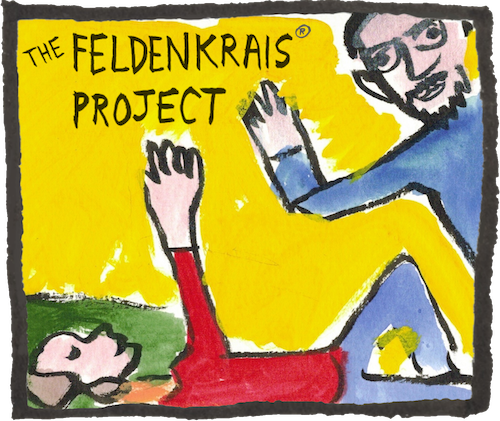ATM is Awareness Through Movement: verbal or self-led Feldenkrais lessons.
"The process of maturing is a very subtle one, for the simple reason that we are both the molding material and steadily becoming our own molders."
- Moshe Feldenkrais in The Potent Self
What we're doing when we study the Feldenkrais Method:
- Becoming more sensitive and aware of our embodied self, and learning healthy, efficient self-use in basic, functional movements, in many positions and orientations. "Enjoy the fish."
- Learning how to learn easier, more efficient, sustainable, pain-free sensory-motor patterns using the sensation-action loop that governs our behavior. "Learn to fish for yourself."
- Becoming aware of our internalized cultural programming that competes with basic truths about our brains and bodies, pain, pleasure, learning, movement, and improvement. We are deeply imbued with "no pain, no gain", though this simply isn't the nature of personal evolution. Let's experience a much more pleasurable and effective way to improve!
- Seeking a restoration of pleasure and pain to their natural purpose as behavior modifiers.
How to do ATM lessons at home, improvising, working from memory or notes from class, or with home study resources such as books or recordings like the Feldenkrais Project.
- Follow your pleasure, and listen to your discomfort. Practice choosing not to increase your discomfort, no matter what. You are a higher authority about you than me, or the lesson instructions.
- Practice being non-judgmental about your present ability. It will expand, but it's all you've got at this particular moment, and judging and worrying about it won't enrich you.
- Find value in your failures and confusion during a lesson. They're a vital part of any natural learning process.
- Breathe. Freely and pleasantly, restoring ease as often as you think of it. Our breath reflects with utter honesty the state of our nervous system, and we can positively influence our nervous system's capacity for change and better organization through easy breathing. Breathing comfortably will also help you stay present for the three bullets above.
- When you're not breathing easily, you will almost certainly notice you are struggling, suffering, or judging; you are not learning at that moment.
- Do less than you can in terms of range and repetitions, and never more. Don't worry if you need to do tiny versions of some movements, or even only visualize them. It's just as helpful, often more so. This is a neurological truth, not an effort on my part to "be nice"!
- Approximate the positions, movements, structure, constraints, etc., of the lesson whenever you need to.
- Learning to improvise a pleasurable, satisfying way of approximating the lesson is FAR MORE valuable for your improvement in the long term and short term than "doing the lesson" more literally and ignoring unpleasant experiences.
- Acknowledge frustrations and insecurities, negative self-talk, and the emotional landscape as you engage the lessons. These things too are impulses in the brain, as real as sensations and movement. If you like, share them with a Feldenkrais Practitioner (here's where to find them), or contact Nick.
- Cultivate your curiosity to create Light, Easy, Soft, Slow, Smooth (LESSS is more) movements, to continue breathing, to find ways to reduce the effort.
- Have fun! Fun is arguably the single most potent condition to cultivate when seeking to learn anything. Picture a young child pursuing a new skill (they learn more complicated things faster than adults do). Does the child engage their will-power? Do they push through pain, discomfort, or frustration? Do they do the same thing rotely over and over, exactly the same way, like a machine? Nope. They play! There's variety, rests, surprises, and joy...and sometimes the goal isn't even clear until they stumble into a new ability, but they then put it to use immediately and spontaneously.
- ASK questions! Check out our Frequently Asked Questions, or Contact me.
So much of life is meeting our demands and obligations, with no value or reward placed on how we do so. Only external outcomes are prized in most of our culture.
We flip this on its head in our ATM lessons: almost all the value is on the how, and the demands (the lesson structure and constraints) can be adjusted infinitely in service of an improvement in HOW--in the quality and pleasure of the exploration.

